From Syria to Sweden: Eiad´s perilous voyage across the Mediterranean
Eiad’s wife did not want him to embark on the perilous journey across the Mediterranean Sea to safety in Europe, but Eiad believed it was their only option. They had tried to build a new life in Egypt, but after two years in the country, Eiad realized he would not be able to provide a good future for his young children there. “Life wasn’t very good in Egypt”, he explains. In spite of his wife’s protests, Eiad decided to risk his life in a rickety boat sailing from Egypt to Italy. His wife and children returned to Damascus. “I was more worried about the kids”, he says. “I thought that if my life will finish, it will finish anyway – in Egypt, in the sea, wherever.”
After one and a half months of searching, he made contact with a human smuggler. The price for getting to Europe: 2,500 dollars. “We went in a group so it would be cheaper. The safest way to travel to Europe is through Turkey but it’s much more expensive. Sometimes, it can cost more than 8000 dollars per person” says Eiad. He describes the five-day boat journey to Italy with more than 300 others as “hell”- people were thrown into the boat and the smugglers did not care if they fell into the water. “If they had animals with them, they would take better care of them because they’re worth more to them”, says Eiad. Still, there was a sense of solidarity between passengers. Eiad recalls how two people almost fell off the boat in their sleep but were caught by the other passengers.
After reaching the shores of Italy, Eiad headed towards Northern Europe and arrived in Sweden on 12 October 2014. Coming here was a great relief, but life as a refugee has its daily struggles. “I miss my family” says Eiad, explaining how he had to adjust to his new life at the asylum-seeker reception centre in Farsta, Stockholm. “Starting over is not easy and leaving your country without your family… it’s hard. A lot of people who came here didn’t want to leave their lives behind in Syria. But it is impossible to give them back the same life here…They are forced to change” he says sadly.
For 36-year-old Eiad, a former shop and restaurant owner, living a slower paced life at the reception centre is a challenge. He often plays cards with some of the other people at the centre to make time pass faster and sometimes he also plays football. “But I have a problem with my back so I can’t do too much sport.” He believes life moves slower in Sweden. “In Syria, we do everything fast. A lot of Arabs find this very frustrating because we are always in a hurry” says Eiad with a laugh,
“We want things to happen faster, and we want to be reunited with our families sooner.”
Eiad says he has not started his life in Sweden yet, not without his family. “Your mind is not clear, it’s with your family, your kids, and you’re waiting to see them.” But despite the continuing concerns for his family, Eiad is hopeful for the future. “I want to finish my studies or work and study at the same time. I don’t like to sit still.” He hopes to use the skills he acquired as a restaurant owner in Syria to start a small restaurant in Sweden, serving Syrian food.
Eiad’s application for asylum has just been approved and he is waiting to be reunited with his wife and two sons, who are still in Syria. “My children are very excited about coming to Sweden”, says Eiad with a big smile. “My wife is worried because she doesn’t know anyone here and it’s strange for her. But I think she’s going to like it. She is an English teacher” he says proudly.
Page 33 of 33
-
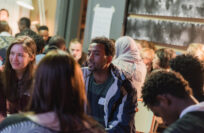
Living Library in Riga: Stories as means for promoting understanding
20.04.2017“What matters is that they all have something to say, and that we can use conversation to erase the artificially constructed boundaries between ‘us’ and ‘them’ in order to see what unites us all”
-
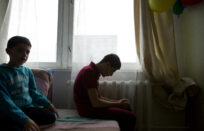
Family from Aleppo finds peace and quiet in a small Estonian town
09.02.2017 -
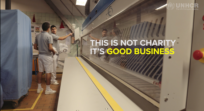
Danish private sector hires refugees – because it’s good business
30.01.2017 -
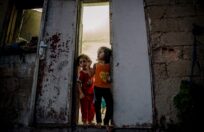
UN seeks $4.63 billion to aid Syrian refugees and host nations
24.01.2017Funding appeal launched at Helsinki event seeks to ease desperate plight of 4.7 million refugees and neighbouring countries hosting them.
-
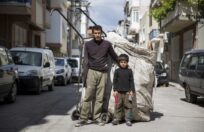
Latvia supports UNHCR’s regional response to the Syria crisis
17.10.2016Latvia’s contribution of EUR 50 000 to the Syria crisis is an important expression of international solidarity in these times of unprecedented humanitarian needs and global displacement.
-

A bright point in darkness
16.06.2016In Iran, Zahra Mesbah was always at the back of the queue. In Iceland, on the other hand, she can even drive a car.
-

In person: Pavel’s successful integration in Lithuania
03.09.2015Pavel, a 45-year-old refugee in Lithuania, escaped from Belarus when the government suppression of opposition activists intensified in 2010. He arrived in Lithuania with the hope, like many Lithuanians who fled their country in the 1940s, that his flight was only a temporary solution and he would soon go back home. Unfortunately, even after 5 years, returning to Belarus is still not an option for Pavel. His life continues in Lithuania away from his beloved family and friends.
-
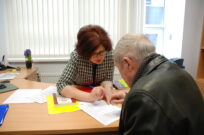
Knowledge of language is the key for becoming a citizen in Latvia
15.08.2015“I am very old, maybe too old,” says Georgij when asked about his age. He has spent almost all his life in Latvia yet he is one of 262,622 non-citizens in the country. Now he is about to leave the premises of the Office of Citizenship and Migration (OCMA) where he has attended a consultation on the naturalization process.
-

A safe space for asylum-seekers fleeing persecution due to their sexual orientation
18.06.2015“From the first moment I stepped into RFSL, I felt like this is the place I belong” says Haris, 22, from the Western Balkans. He is a dancer, model and writer, back home he was a university student. Haris is currently seeking asylum in Sweden based on his sexual orientation. […]
